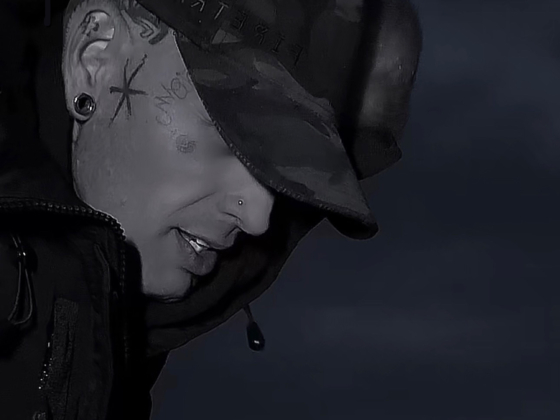Hot Mulligan has released the follow-up to 2023s Why Would I Watch with their 4th studio album, The Sound a Body Makes When It’s Still, released via Wax Bodega on August 22, 2025.
Lansing, Michigan, Pop Punk quintet, Hot Mulligan, are back after 2023's Why Would I Watch with arguably their most dense and thematically heavy album to date, The Sound a Body Makes When it’s Still. Sequentially consistent and conceptually weighted, the album feels like the most mature effort from the band yet, with songs that touch on everything from self-loathing to growing up to paranoia and dealing with loss in death. However, despite the clear development in the conceptual content of the album, the production and instrumentation leave more to be desired. Returning longtime producer Brett Romnes does more to maintain the status quo than to push the band towards sonic exploration. Indeed, the production is consistent, but it tows the line of being a bit one note and, by the end of the album, could leave listeners feeling as though it’s just another Hot Mulligan album, which isn’t a bad thing by any means (catchy choruses, well-sequenced tracklist, introspective lyrics, etc.), but it doesn’t necessarily do enough to keep up with the amount of lyrical growth that the album exhibits throughout its 42-minute runtime.
The album opens with the beautifully melancholic “Moving to Bed Bug Island,” which sees frontman Nathan "Tades" Sanville softly crooning over an acoustic guitar riff as he expresses feelings of constant and overwhelming pessimism that leave little room for distraction, echoing a refrain that seems to be directly in reference to such feelings. “It’s coming back, it’s coming back again,” he repeats throughout the song. Without warning, the track explodes into a bombastic chorus featuring soaring vocals laden between thumping and beefy kick drums, a sharp snare, and some undertones that include subtle bass and electric guitar, along with some more forward-facing acoustic licks. “I’ll stay cold / Huddled in the Basement,” Sanville screams over the instrumentation, clearly opting to face this looming despair head-on where he may have once sought escape. This concept is solidified in the second verse as Sanville begins to question if he can actually handle his feelings. “Isn't this what you wanted, to feel your hurt? / Each whisper now echoes as if you have screamed / Isn't this why you sing?” he asks himself before the chorus crashes back in. The song concludes with another refrain hidden behind a robotic vocal effect that simply repeats “No time, no time to handle.”
Despite Sanville’s declaration to “…stay cold / huddled in the basement,” the allure to avoid, neglect, and forget constantly resurfaces as he’s faced with the summation of issues that have been left on the back burner for far too long. “Though, the later I'm awake, it makes it easier to hide / Won't have to reckon with my problems if I refuse to try,” Sanville sings over bright production that’s reminiscent of early 2000s pop punk bands like Sum 41 or Simple Plan on “Bon Jonah,” a song in which the frontman questions if the intensity of his feelings is a fabrication of his thoughts; if they’re all in his head.
However, the problems become painfully tangible on songs like “Monica Lewinskibidi,” a soul-crushing track in which Sanville laments the death of his father, which occurred while he was away in Tokyo. Emotionally dense and sonically introspective, Sanville outlines the mental difficulty of visiting a father whose health is in decline, one who is unable to speak and haunted by dissociative stares.”Six hours from my house to yours / Seems further when I'm close / It seems like I'm afraid of you / Like I try to stay away,” Sanville sings, adding to the theme of reluctance at facing problems, even if said problems are long past the point of requiring some level of adherence. The song culminates in a painful performance from Sanville, in which the production itself seems to reflect what sounds like an emotional breakdown. The tempo slows to a sluggish drone that sounds like a sonic unraveling as the band’s frontman begs for more time, promising to stop ignoring his loved ones. “I can't let you lay there and sleep / Still time if you'd stay up with me / I won't ignore all the people I love anymore / If you'd give me a second now.” Sanville’s voice cracks under the pressure of the emotional weight as he delivers these lines, and the song ends with him begging his father to wake up.
As if in response to “Monica Lewinskibidi,” the following track, “Milam Minute,” an acoustic ballad, acts as an interlude of sorts in which secondary band vocalist Chris Freeman sings about a funeral. Given the context of the previous track, it’s easy to interpret the song as the emotional continuation of “Monica Lewinskibidi,” with lines like “The places that I've been / I'd tell you about them,” and an outro which sees Freeman pondering what the deceased would have said if they were around to hear his stories and anecdotes, concluding that they would be proud. The song ends with the refrain “I’m so proud of you” along with soft piano keys that feel like a chapter ending.
What proceeds are several tracks that seem to deal with Sanville’s battles with depression, paranoia, and sobriety, potentially in response to his father’s death. On “Cream of Wheat of Feet Naw Cream of (Feat.)” Sanville discusses a shadow that’s been stalking him, while on “Carbon Monoxide Hotel,” he touches on the horrific reality of being sober, concluding with the painfully self-aware line “Time I couldn't recount, catching up with me,” an obvious realization that problems the singer was once able to drink away have begun resurfacing.
Some standouts on the tracklist include “It Smells Like Fudge Axe in Here,” (which has an accompanying music video), “Mix Master Wade on the Beat,” “Slumdog Scungillionaire,” and the album’s closer, “My Dad Told Me to Write a Nice One for Nana So This Is It.”
These songs range from poppy, post-emo anthems on “It Smells Like Fudge Axe in Here” and “Mix Master Wade on the Beat” to sullen and reflective on “My Dad Told Me to Write a Nice One for Nana So This Is It,” to completely unhinged and self hating on “Slumdog Scungillionaire,” which climaxes in Sanville screaming his lungs out, almost to the point where he can scarcely be discerned amidst the heavy backdrop of intense electric guitar chords and thumping drums. “Hold still, I can show you (Fear like you've never felt) / Only if they knew you (How fucking disgusting you are) / Hateful, useless coward (Choke on the marigold) / Stay cold, die a failure (A bottle won't help you escape).” This is, without a shadow of a doubt, the emotional summit of the album, seeming to reflect every major theme the album has explored in just a few lines. It’s heavy, but there’s a sense of catharsis in its wake, especially given the stripped-back melancholy and nostalgia of the closing track.
“My Dad Told Me to Write a Nice One for Nana So This Is It” is pretty self-explanatory, seeing Sanville writing a nostalgic ode to a family member, reminiscing about the times he spent with them skipping stones, playing in the snow, and being dropped off at school. “There's no saint like you / Thеre's no way I'd part with you,” Sanville belts out to close the album. All in all, The Sound a Body Makes When It’s Still is a conceptually beautiful album, held back only by a track length that could stand to lose two or three tracks, and production that feels slightly stagnant when contextualized by their other projects. However, it’s a must listen for anyone who enjoys emo or post-emo and is looking for an album full of vulnerability, introspection, and conceptual cohesion that truthfully feels like one long life lesson.









